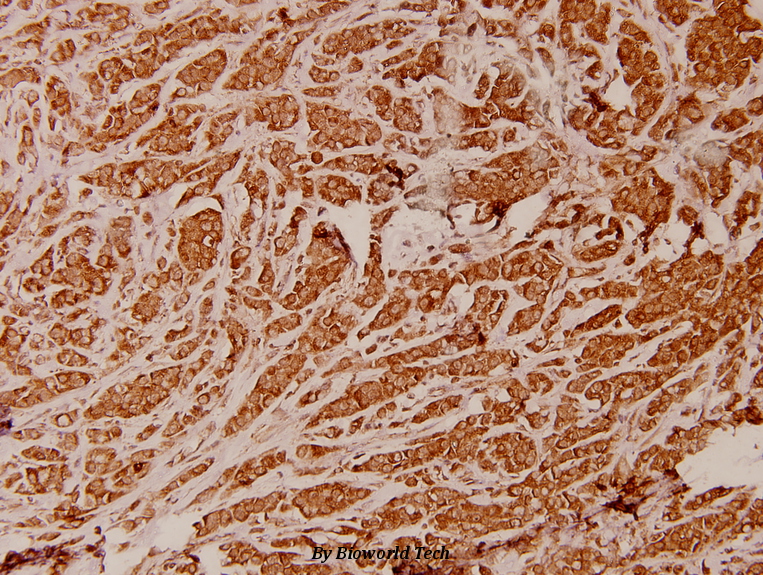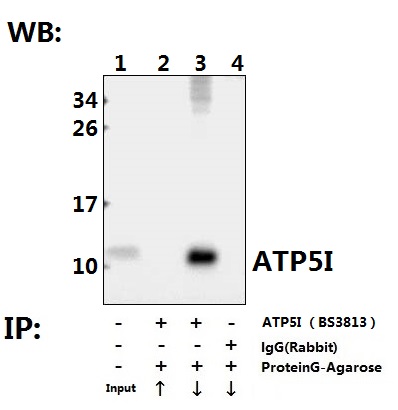Product Name :
ATP5I (K69) polyclonal antibody Background :
Mitochondrial ATP synthases (ATPases) transduce the energy contained in membrane electrochemical proton gradients into the energy required for synthesis of high-energy phosphate bonds. ATPases contain two linked complexes: F1, the hydrophilic catalytic core; and F0, the membrane-embedded protein channel. The two complexes are linked by a central stalk and a peripheral stalk. During catalysis, ATP synthesis in the catalytic domain of F1 is coupled, via a rotary mechanism of the central stalk subunits, with proton translocation across the membrane. ATP5I, also known as mitochondrial ATP synthase subunit E or ATP5K, is a 69 amino acid protein member of the ATPase E subunit family. Localized to the inner membrane of the mitochondria, ATP5I is a part of the F0 complex. Product :
Rabbit IgG, 1mg/ml in PBS with 0.02% sodium azide, 50% glycerol, pH7.2 Storage&Stability :
Store at 4°C short term. Aliquot and store at -20°C long term. Avoid freeze-thaw cycles. Specificity :
ATP5I (K69) polyclonal antibody detects endogenous levels of ATP5I protein. Immunogen :
Synthetic peptide, corresponding to amino acids 50-100 of Human ATP5I. Conjugate :
Unconjugated Modification :
Unmodification
ATP5I (K69) polyclonal antibody Background :
Mitochondrial ATP synthases (ATPases) transduce the energy contained in membrane electrochemical proton gradients into the energy required for synthesis of high-energy phosphate bonds. ATPases contain two linked complexes: F1, the hydrophilic catalytic core; and F0, the membrane-embedded protein channel. The two complexes are linked by a central stalk and a peripheral stalk. During catalysis, ATP synthesis in the catalytic domain of F1 is coupled, via a rotary mechanism of the central stalk subunits, with proton translocation across the membrane. ATP5I, also known as mitochondrial ATP synthase subunit E or ATP5K, is a 69 amino acid protein member of the ATPase E subunit family. Localized to the inner membrane of the mitochondria, ATP5I is a part of the F0 complex. Product :
Rabbit IgG, 1mg/ml in PBS with 0.02% sodium azide, 50% glycerol, pH7.2 Storage&Stability :
Store at 4°C short term. Aliquot and store at -20°C long term. Avoid freeze-thaw cycles. Specificity :
ATP5I (K69) polyclonal antibody detects endogenous levels of ATP5I protein. Immunogen :
Synthetic peptide, corresponding to amino acids 50-100 of Human ATP5I. Conjugate :
Unconjugated Modification :
Unmodification
-
 Western blot (WB) analysis of ATP5I (K69) pAb at 1:500 dilution Lane1:AML-12 whole cell lysate(40ug) Lane2:C6 whole cell lysate(40ug) Lane3:HepG2 whole cell lysate(40ug) Lane4:PC3 whole cell lysate(40ug) Lane5:HEK293T whole cell lysate(40ug)
Western blot (WB) analysis of ATP5I (K69) pAb at 1:500 dilution Lane1:AML-12 whole cell lysate(40ug) Lane2:C6 whole cell lysate(40ug) Lane3:HepG2 whole cell lysate(40ug) Lane4:PC3 whole cell lysate(40ug) Lane5:HEK293T whole cell lysate(40ug) -
 Immunohistochemistry (IHC) analyzes of ATP5I (K69) pAb in paraffin-embedded human breast carcinoma tissue at 1:100.
Immunohistochemistry (IHC) analyzes of ATP5I (K69) pAb in paraffin-embedded human breast carcinoma tissue at 1:100. -
 Immunohistochemistry (IHC) analyzes of ATP5I (K69) pAb in paraffin-embedded human breast carcinoma tissue at 1:100.
Immunohistochemistry (IHC) analyzes of ATP5I (K69) pAb in paraffin-embedded human breast carcinoma tissue at 1:100.
Bioworld Biotech only provide peptides for our antibodies and do not provide additional peptide customization services.
Price/Size :
USD 368/1mg/vial
Tips:
For phospho antibody, we provide phospho peptide(0.5mg) and non-phospho peptide(0.5mg).Describe :
Blocking peptides are peptides that bind specifically to the target antibody and block antibody binding. These peptide usually contains the epitope recognized by the antibody. Antibodies bound to the blocking peptide no longer bind to the epitope on the target protein. This mechanism is useful when non-specific binding is an issue, for example, in Western blotting (WB) and Immunohistochemistry (IHC). By comparing the staining from the blocked antibody versus the antibody alone, one can see which staining is specific; Specific binding will be absent from the western blot or IHC performed with the neutralized antibody.Formula:
Synthetic peptide was lyophilized with 100% acetonitrile and is supplied as a powder. Reconstitute with 0.1 ml DI water for a final concentration of 10 mg/ml.The purity is >90%,tested by HPLC and MS.
Storage:
The freeze-dried powder is more stable. For short time at 2-8°C. For long term storage store at -20°C.
Note :
This product is for research use only (RUO only). Not for use in diagnostic or therapeutic procedures.
 ATP5I (K69) polyclonal antibody
ATP5I (K69) polyclonal antibody  Datasheet
Datasheet COA
COA MSDS
MSDS SHIP
SHIP